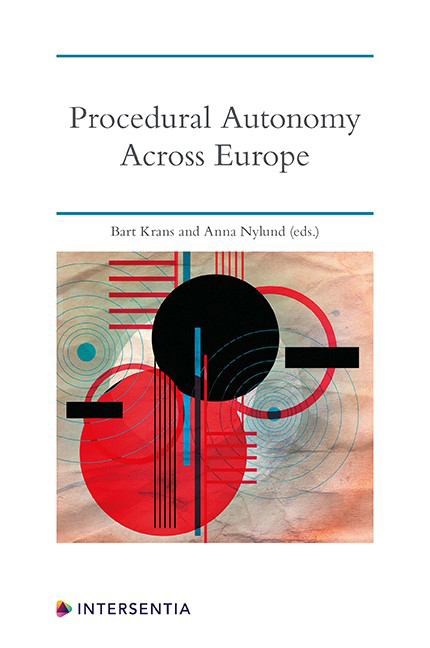Book contents
- Frontmatter
- Preface
- Contents
- Table of Cases
- List of Authors
- Aspects of Procedural Autonomy
- Procedural Autonomy and Belgian Civil Procedure Law: A Turbulent Cohabitation
- The English Approach to Procedural Autonomy
- The Finnish Way of Understanding Procedural Autonomy: A Practical Approach to Implementing EU Civil Procedural Law
- A German Perspective on the Waning Procedural Autonomy in Civil Matters: Who is Afraid of European Civil Procedure?
- Procedural Autonomy in the Netherlands: A Fading Relic?
- Procedural Autonomy, the EEA Agreement and Norwegian Law: The Art of Bridging a Gap and Maintaining it Too
- A Polish Perspective on Collective Civil Proceedings: Reluctance to Follow EU Recommendations?
- Procedural Autonomy between EU Law and the Slovenian Law of Civil Procedure
- Autonomy of the Spanish Legislator in the Regulation of Procedural Law: The Borders of European Case Law
- Procedural Autonomy in Sweden: Is Materielle Prozessleitung the Answer?
- Comparative Insights on Procedural Autonomy
- Index
- ABOUT THE EDITORS
A Polish Perspective on Collective Civil Proceedings: Reluctance to Follow EU Recommendations?
Published online by Cambridge University Press: 30 April 2020
- Frontmatter
- Preface
- Contents
- Table of Cases
- List of Authors
- Aspects of Procedural Autonomy
- Procedural Autonomy and Belgian Civil Procedure Law: A Turbulent Cohabitation
- The English Approach to Procedural Autonomy
- The Finnish Way of Understanding Procedural Autonomy: A Practical Approach to Implementing EU Civil Procedural Law
- A German Perspective on the Waning Procedural Autonomy in Civil Matters: Who is Afraid of European Civil Procedure?
- Procedural Autonomy in the Netherlands: A Fading Relic?
- Procedural Autonomy, the EEA Agreement and Norwegian Law: The Art of Bridging a Gap and Maintaining it Too
- A Polish Perspective on Collective Civil Proceedings: Reluctance to Follow EU Recommendations?
- Procedural Autonomy between EU Law and the Slovenian Law of Civil Procedure
- Autonomy of the Spanish Legislator in the Regulation of Procedural Law: The Borders of European Case Law
- Procedural Autonomy in Sweden: Is Materielle Prozessleitung the Answer?
- Comparative Insights on Procedural Autonomy
- Index
- ABOUT THE EDITORS
Summary
INTRODUCTION
In Poland, there exist a few systems and hierarchies of state courts (as well as the State Tribunal and the Constitutional Tribunal) with hugely varied procedures and differentiated structures. The Polish judicial system consists of the Supreme Court, administrative courts (including the Supreme Administrative Court), military courts and ordinary courts (civil cases, among others, are dealt with by them). Ordinary courts include 321 district courts (sądy rejonowe), 45 regional courts (sądy okręgowe) and 11 courts of appeal (sądy apelacyjne). They are organised into divisions, first and foremost criminal divisions and civil divisions; judges are usually specialised in certain fields of law. Decisions of district courts can be appealed to a competent regional court and decisions adopted by regional courts as courts of first instance to a competent court of appeal (two-instance proceedings).
There is one thing on which both Polish EU-sceptics and Polish EU-enthusiasts must agree: for over a dozen years Polish civil law, including civil procedural law, has been undergoing intensive EU-Europeanisation. The main focus of this chapter is on the relationship between EU law and Polish civil procedural law in the area of collective civil proceedings; the impact of other European fora on Polish law, including the impact of the European Court of Human Rights, are not going to be analysed therein.
The normative (formal) Europeanisation is the process whereby domestic civil law is adapted to conform to EU rules and may be related to substantive laws, the institutional design of administration of justice, as well as procedural laws. The first and second are beyond the scope of this chapter and the latter may be associated with the phenomenon traditionally branded as national procedural autonomy. According to Rewe/Comet doctrine, in the absence of EU rules on the subject, it is for the domestic legal system of each Member State to determine the procedural framework (procedural autonomy) governing actions at law intended to ensure the protection of the rights which citizens derive from the direct effect of EU law, but this national design must fully respect the EU principles of equivalence and effectiveness.
- Type
- Chapter
- Information
- Procedural Autonomy Across Europe , pp. 139 - 164Publisher: IntersentiaPrint publication year: 2020



